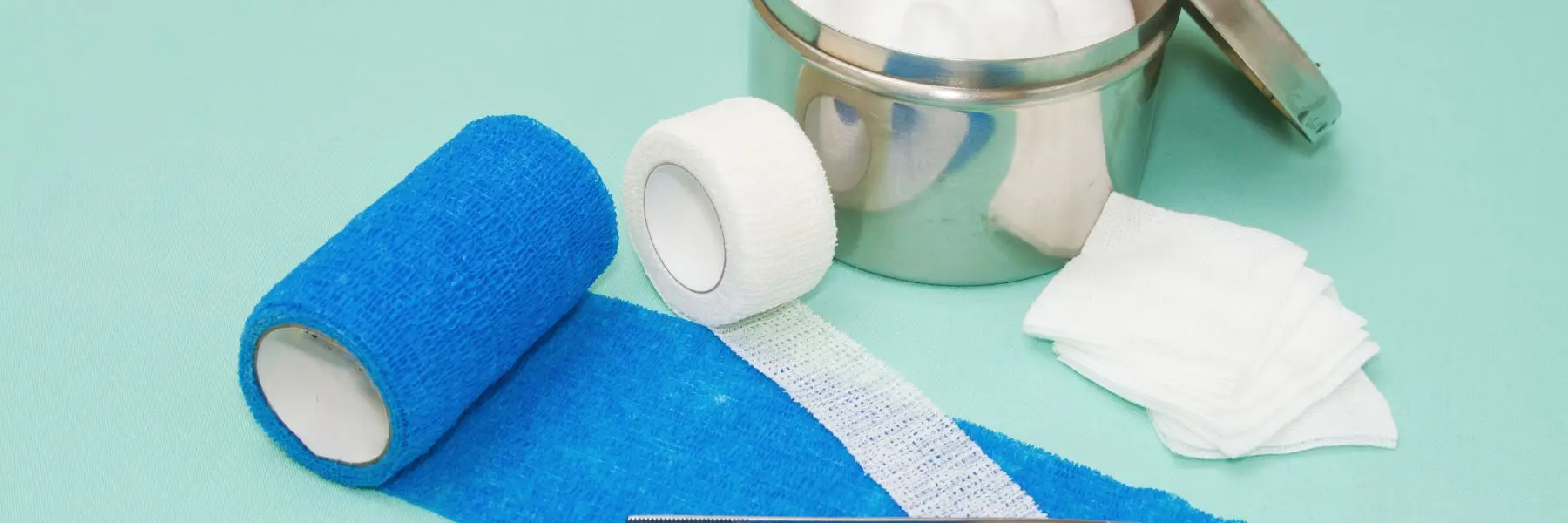Vascular Wound Care
Vascular Would Care
At Collective Care, our wound care service experts understand that vascular wound care represents a critical component of comprehensive healthcare management for patients experiencing circulation-related injuries and ulcerations. Vascular wounds require dedicated attention, advanced treatment protocols, and ongoing monitoring to achieve optimal healing outcomes and prevent serious complications.
Schedule Your Consultation Today
What Are Vascular Wounds?
Vascular wounds are chronic ulcerations that develop when compromised blood circulation prevents adequate delivery of oxygen and nutrients to tissues. These wounds occur due to problems in the arterial, venous, or lymphatic systems, which impair the body’s natural ability to maintain healthy tissue and support the healing process. Unlike acute injuries that heal predictably, vascular wounds persist for weeks or months and require specialized medical intervention to address both the underlying circulation problems and the wound itself.
2 Kinds of Vascualr Wounds
There are two primary types of vascular wounds: arterial and venous ulcers. Arterial wounds typically appear on the feet and toes as deep, well-defined ulcers with minimal drainage, often causing significant pain due to insufficient blood flow delivering oxygen to tissues. Venous wounds commonly develop around the ankle and lower leg areas, presenting as irregularly shaped ulcers with moderate to heavy drainage caused by blood pooling when damaged veins cannot efficiently return blood to the heart. Both types require specific treatment approaches that address the underlying vascular condition while promoting wound healing through appropriate wound care techniques.

Our Vascular Wound Services
At Collective Care, our comprehensive vascular wound care programs address circulation-related wounds through evidence-based treatment protocols and advanced therapeutic interventions. We provide specialized wound care services designed to promote healing and prevent complications in patients with arterial and venous ulcerations.
Our Services Include:
- Comprehensive Wound Assessment: Detailed evaluation of wound characteristics, vascular status, and underlying circulation problems to develop individualized treatment plans for optimal vascular wound care outcomes.
- Advanced Diagnostic Testing: Ankle-brachial index measurements, duplex ultrasound studies, and vascular imaging to identify specific areas of arterial stenosis or venous insufficiency affecting wound healing.
- Arterial Wound Management: Specialized treatment protocols for arterial ulcers including revascularization coordination, advanced wound dressings, and pain management strategies to address compromised blood flow.
- Venous Wound Treatment: Comprehensive venous ulcer care featuring multi-layer compression therapy, edema management, and moisture-retentive dressing systems to promote healing and prevent recurrence.
- Negative Pressure Wound Therapy: Advanced vacuum-assisted closure technology that removes excess fluid, reduces bacterial burden, and stimulates granulation tissue formation in complex vascular wounds.
- Hyperbaric Oxygen Therapy: Enhanced tissue oxygenation treatments for patients with arterial insufficiency or diabetes-related vascular complications to support cellular metabolism and wound healing.
- Bioengineered Skin Substitutes: Advanced cellular therapies and tissue-engineered products that provide scaffolding for tissue regeneration while delivering growth factors to promote wound closure.
- Compression Therapy Programs: Graduated compression systems including bandaging and stockings to reduce venous hypertension, decrease edema, and improve circulation in patients with venous insufficiency.
- Patient Education and Prevention: Comprehensive training programs focusing on wound prevention strategies, proper footwear selection, daily inspection techniques, and early recognition of circulation problems.
- Interdisciplinary Care Coordination: Collaborative approach involving vascular surgeons, wound care nurses, physical therapists, and other specialists to address the complex needs of vascular wound patients.
- Infection Management: Prompt identification and treatment of wound infections through advanced diagnostic techniques, appropriate antibiotic therapy, and antimicrobial dressing applications.
- Pain Management Services: Multimodal pain control strategies addressing both nociceptive and neuropathic components commonly associated with vascular wounds and underlying circulation disorders.
- Outcome Monitoring and Documentation: Systematic tracking of healing progress through wound measurements, photographic documentation, and patient-reported outcomes to guide treatment modifications.
Our wound care services combine clinical excellence with compassionate patient care to achieve optimal healing outcomes for individuals with vascular wounds. Through our comprehensive approach to vascular wound care, we help patients regain function, reduce pain, and improve their overall quality of life while preventing serious complications and recurrence.
Why Choose Collective Care For Vascular Wound Care?
Collective Care stands out as a leading provider of vascular wound care through our commitment to evidence-based treatment protocols and patient-centered healing approaches. Our comprehensive wound care services combine advanced technology with compassionate care to deliver superior outcomes for patients with complex circulation-related wounds.
What Sets Us Apart:
- Advanced Treatment Technologies: We utilize cutting-edge therapies including negative pressure wound therapy, hyperbaric oxygen treatment, and bioengineered skin substitutes to accelerate healing in complex vascular wounds.
- Interdisciplinary Care Team: Our collaborative approach brings together vascular surgeons, certified wound care nurses, physical therapists, and other specialists to address all aspects of vascular wound care management.
- Comprehensive Vascular Assessment: We provide thorough diagnostic evaluation using ankle-brachial index testing, duplex ultrasound, and advanced imaging to identify underlying circulation problems affecting wound healing.
- Individualized Treatment Plans: Each patient receives customized vascular wound care protocols based on their specific wound characteristics, vascular status, and personal health goals for optimal healing outcomes.
- Evidence-Based Protocols: Our treatment approaches follow the latest clinical guidelines and research findings in vascular wound care to ensure patients receive the most effective interventions available.
- Patient Education Focus: We empower patients through comprehensive education programs covering wound prevention, proper care techniques, and early recognition of complications to prevent recurrence.
- Convenient Access to Care: Our wound care services are readily accessible with flexible scheduling options and multiple locations to accommodate patient needs and treatment requirements.
- Advanced Compression Therapy: We offer the latest compression systems and techniques specifically designed for venous wound management and prevention of venous ulcer recurrence.
- Infection Prevention and Management: Our proactive approach to infection control includes advanced diagnostic techniques, appropriate antimicrobial therapy, and specialized wound dressing protocols.
- Outcome Tracking and Quality Improvement: We systematically monitor healing progress and patient outcomes to continuously refine our vascular wound care approaches and ensure the highest quality results.
- Insurance Coverage Assistance: Our team works with patients to maximize insurance benefits and navigate coverage options for necessary vascular wound care treatments and services.
- Pain Management Integration: We provide comprehensive pain control strategies that address the unique challenges associated with vascular wounds while supporting patient comfort and treatment compliance.
When you choose Collective Care for your vascular wound care needs, you gain access to a dedicated team committed to healing excellence and improved quality of life. Our comprehensive approach ensures that you receive the most advanced wound care services available while benefiting from personalized attention and ongoing support throughout your healing journey.
Ready to Start Your Healing Journey?
Don’t let vascular wounds limit your quality of life. Contact Collective Care today to schedule your comprehensive vascular wound care assessment and take the first step toward effective healing. Our dedicated team is ready to provide you with personalized treatment solutions and compassionate care.
Schedule Your Consultation Today
Vascular Wound Care FAQs
How long does it typically take for vascular wounds to heal? Healing times for vascular wounds vary significantly depending on the underlying circulation problem, wound size, and patient health factors. Arterial wounds may take several months to heal once adequate blood flow is restored, while venous wounds often show improvement within 4-6 weeks of proper compression therapy but may require 3-6 months for complete closure.
Can vascular wounds heal without surgery? Many venous wounds can heal with conservative treatments like compression therapy, wound dressings, and lifestyle modifications. However, arterial wounds often require surgical intervention to restore blood flow before healing can occur. Some patients may benefit from minimally invasive procedures like angioplasty instead of traditional surgery.
What lifestyle changes help prevent vascular wound recurrence? Maintaining a healthy weight, exercising regularly within your limitations, avoiding prolonged standing or sitting, wearing prescribed compression stockings, and managing diabetes and blood pressure effectively all help prevent wound recurrence. Smoking cessation is particularly important for arterial circulation improvement.
Are vascular wounds painful? Arterial wounds are typically more painful than venous wounds, especially when the leg is elevated or at rest. Venous wounds may cause aching, heaviness, or burning sensations. Pain management is an important component of vascular wound care and should be discussed with your healthcare provider.
What warning signs indicate my vascular wound needs immediate medical attention? Seek immediate care if you notice increased redness spreading from the wound, red streaks on the skin, increased warmth around the wound, sudden worsening pain, fever, or foul-smelling discharge. These signs may indicate serious infection requiring prompt treatment.
Can diabetes affect vascular wound healing? Diabetes significantly impacts vascular wound care by reducing circulation, impairing immune function, and slowing the healing process. Maintaining optimal blood sugar control is essential for successful wound healing, and diabetic patients often require more intensive monitoring and treatment protocols.
What role does nutrition play in vascular wound healing? Proper nutrition supports tissue repair and immune function essential for wound healing. Adequate protein intake, vitamin C, zinc, and staying well-hydrated all contribute to faster healing. Patients with poor nutritional status may require dietary counseling or supplements as part of their vascular wound care plan.
How often should vascular wounds be cleaned and dressed? Dressing change frequency depends on the wound type, drainage amount, and dressing material used. Most vascular wounds require dressing changes every 2-7 days, but heavily draining wounds may need daily attention. Your healthcare provider will establish an appropriate schedule based on your specific wound characteristics.
Is it normal for vascular wounds to have an odor? A mild odor may be normal depending on the wound type and dressing used. However, strong, foul, or sweet odors often indicate bacterial infection and require immediate medical evaluation. Regular wound cleaning and appropriate dressing selection help minimize normal wound odors.
Can I shower or bathe with a vascular wound? Showering is generally safe with proper wound protection using waterproof dressings or coverings. Avoid soaking the wound in bathtubs, hot tubs, or swimming pools, as prolonged water exposure can soften tissue and increase infection risk. Follow your healthcare provider’s specific bathing instructions for your wound type.
